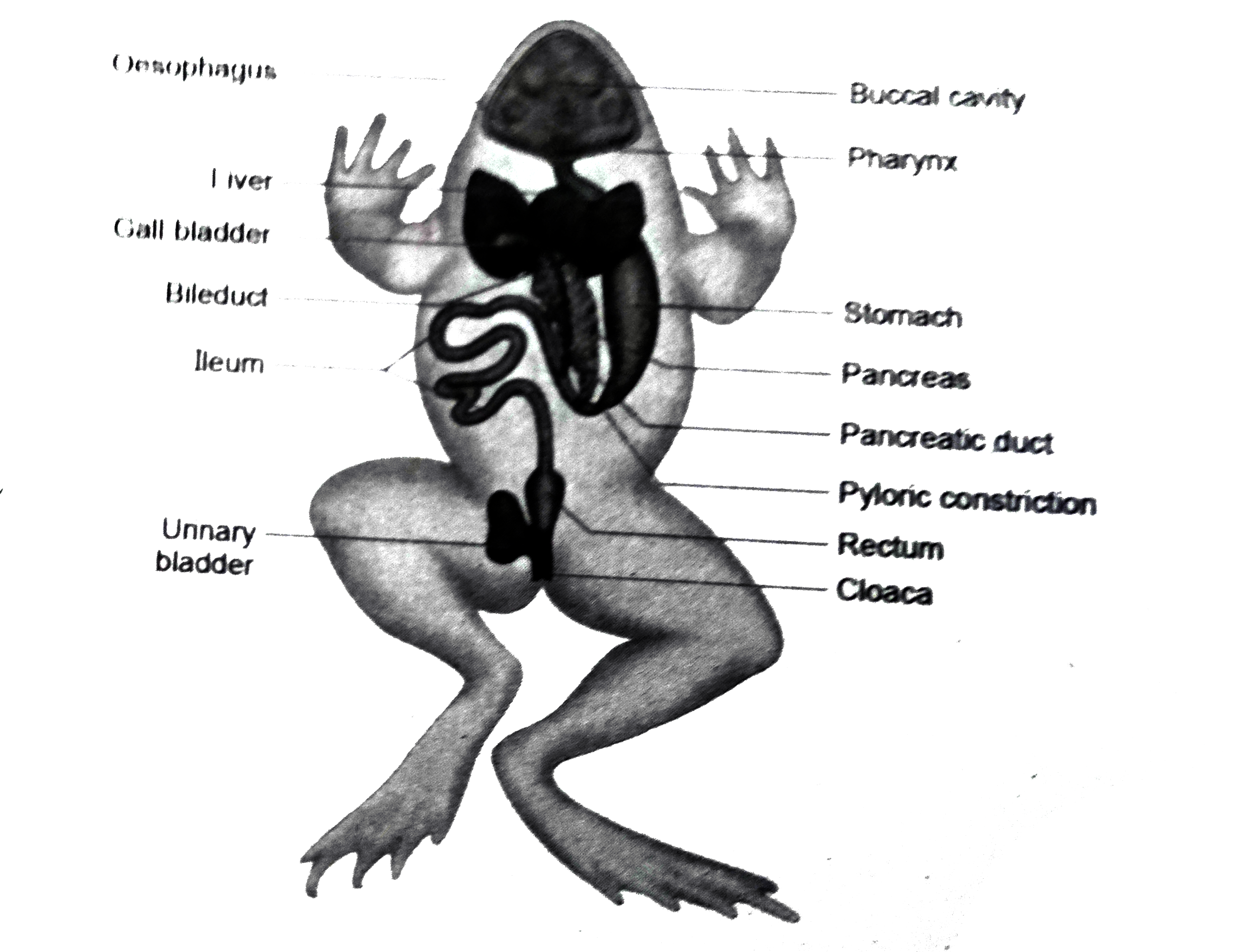Explain the digestive system of frog.Solution in Tamil
The alimentary canal consists of the buccal cavity, pharynx, oesophagus, duodenum, ileum and the rectum which leads to the cloaca and opens outside by the cloacal aperture. The wide mouth opens into the buccal cavity. On the floor of the buccal cavity lies a large muscular sticky tongue. The tongue is attached in front and free behind. The free edge is forked. When the frog sights an insect it flieks out its tongue and the insect gets glued to the sticky tongue. The longue is immediately withdrawn and the mouth closes. A row of small and pointed maxillary teeth is found on the inner region of the upper jaw. In addition vomerine teeth are also present as two groups, one on each side of the internal nostrils. The lower jaw is devoid of teeth. The mouth opens into the buccal cavity that leads to the oesophagus through the pharynx. Oesophagus is a short tube that opens into the stomach and continues as the intestino, rectum and finally opens outside by the clouca, Liver secretes bile which is stored in the gall bladder. Pancreas, a digestive gland produces pancreatic juice containing digestive enzymes.
Food is captured by the bilobed tongue. Capg Digestion of food takes place by the action of hydrochloric acid and gastric juices secreted from the walls of the stomach. Partially digested food called chyme is passed from the stomach to the Pareraduct first part of the intestine, the duodenum. The duodenum receives bile from the gall bladder and pancreatic juices from the pancreas through a common bile duct. Bile emulsifies fat and pancreatic juices digest carbohydrates, proteins and lipids. Final digestion takes place in the intestine. Digested food is absorbed by the numerous finger-like folds in the inner wall of intestine called villi and microvilli. The undigested solid waste moves into the rectum and passes out through the cloaca.

Topper's Solved these Questions
- ORGAN AND ORGAN SYSTEMS IN ANIMALS BOOK - FULL MARKSCHAPTER - ORGAN AND ORGAN SYSTEMS IN ANIMALS EXERCISE - ADDITIONAL QUESTIONS SOLVED (II Fill in the blanks)
36 Videos
- NEURAL CONTROL AND COORDINATIONBOOK - FULL MARKSCHAPTER - NEURAL CONTROL AND COORDINATIONEXERCISE - ADDITIONAL QUESTIONS SOLVED (Long Answer Questions:)
25 Videos
- PHOTOSYNTHESISBOOK - FULL MARKSCHAPTER - PHOTOSYNTHESISEXERCISE - ADDITION QUESTIONN SOLVED (HIGHER ORDER THINKING SKILLS )
7 Videos
Similar Questions
........ .... are the earthworms found in deeper layers of the soil.
View SolutionExplain the structure of a neuron.
View SolutionSuccelents are know to keep their stomata closed during the day to check transpiration . How do they meet their photosyntheitc CO2 requirements ?
View SolutionWhich statement is not true regarding the digestive system of frog?
View SolutionDescribe the digestive system of frog.
View SolutionChoose the correct statement for the digestive system of frog :
View SolutionDraw the digestive system of frog and label the parts.
View SolutionDraw the digestive system of frog and label the parts.
View SolutionDraw a neat diagram of digestive system of frog.
View SolutionDraw a neat diagram of digestive system of frog.
View SolutionDraw a neat diagram of digestive system of frog.
View SolutionDescribe digestive system of frog with diagram.
View SolutionDraw a neat diagram of digestive system of frog.
View SolutionFrog -Anatomy || Frog-Digestive system || Respiratory-system
View SolutionWhich statement is not true regarding the digestive system of frog?
View Solution
